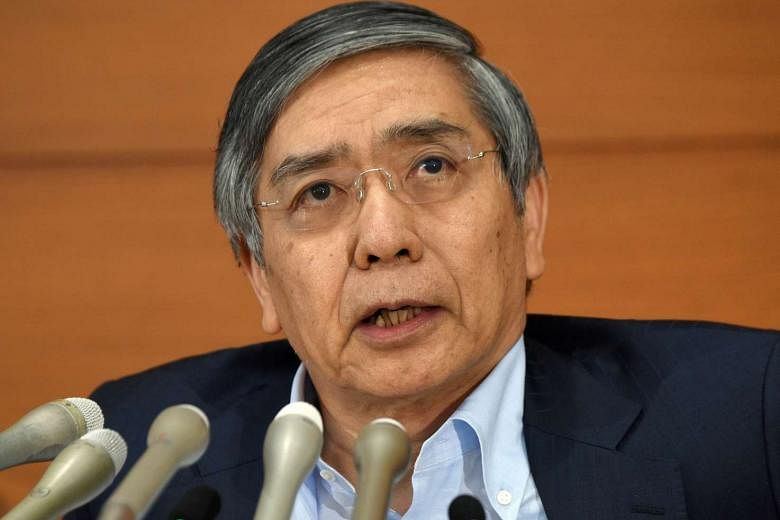TOKYO (BLOOMBERG) - The Bank of Japan refrained from expanding monetary stimulus as Governor Haruhiko Kuroda bets the world's third-biggest economy will emerge from a recent soft patch and inflation will pick up.
The central bank will keep increasing the monetary base at an annual pace of 80 trillion yen (S$885.1 billion), as expected by all 37 economists surveyed by Bloomberg.
BOJ officials are assessing the strength of a rebound from what Goldman Sachs Group Inc. and JPMorgan Chase & Co. estimate to be the first contraction since the economy took a dive last year after a sales-tax hike. While Kuroda sees last quarter's weakness as temporary, high inventories and a slowdown in China are risks to achieving his 2 percent inflation target.
"Unless inflation gains a bit more momentum, it'll get harder for the BOJ to reach its goal within its timeframe," said Maiko Noguchi, an economist at Daiwa Securities Group Inc. and a former official at the central bank.
Daiwa Institute of Research estimates the economy shrank as much as an annualized 3.3 percent in the three months through June, ending two quarters of expansion.
Mr Kuroda said on July 15 that he didn't think "at all" that weakness last quarter will continue, and reiterated his view that inflation will reach 2 per cent around the six months through September 2016.
The central bank has been highlighting indicators showing inflation pressures building. One gauge that strips out fresh food as well as as energy costs that have steamrolled its main measure to near 0 percent showed inflation picking up to 0.7 per cent in May.
Mr Kuroda said on Friday that while oil prices could affect the timing of reaching the inflation goal - and that the BOJ would adjust policy if needed - they weren't affecting the trend of prices at the moment.
"Compared with the situation last October, I think we can say that the trend of oil prices is different," he said at a briefing. "We will carefully monitor developments in oil prices."
Some officials see gains in the BOJ's main measure accelerating to around 1 percent by December from 0.1 percent in June as the damping effects from oil start to fade from around October, people familiar with the matter said recently.
Reaching the 2 percent inflation target by September next year could be at risk if weakness persists, the people said.
The yen was little changed against the dollar at 124.77 at 5:35 p.m. in Tokyo. It's lost 12 percent since Kuroda unexpectedly bolstered the asset-purchase program last October in the midst of plunging oil prices. The Topix stock index rose 0.3 percent Friday.
The economy has been showing signs of strain. Exports dropped in the second quarter the most since late 2012, according to data from the BOJ. Retail sales fell in June for the third time this year, and while industrial output increased more than forecast, inventories rose to the highest level since 2009, raising the risk that manufacturers curtail production in coming months.
Still, the BOJ noted in its statement that housing investment has been picking up, a slightly more upbeat view than last month.
The BOJ sees the economy rebounding this quarter after a temporary slowdown in the three months through June, said Masaki Kuwahara, an economist at Nomura Securities Co.
"Their economic view basically hasn't changed," said Kuwahara.
Just one economist in the Bloomberg survey said inflation would reach the 2 percent goal around the April-September 2016 window predicted by Kuroda. Twenty-one predict an eventual boost in stimulus.

